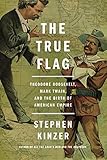The true flag : Theodore Roosevelt, Mark Twain, and the birth of American empire / Stephen Kinzer.
Material type: TextLanguage: English Publisher: New York : St. Martin's Griffin, 2018Edition: First St. Martin's Griffin editionDescription: 308 pages, 8 unnumbered pages of plates : illustrations ; 21 cmContent type:
TextLanguage: English Publisher: New York : St. Martin's Griffin, 2018Edition: First St. Martin's Griffin editionDescription: 308 pages, 8 unnumbered pages of plates : illustrations ; 21 cmContent type: - text
- unmediated
- volume
- 9781250159687 (pbk)
- Spanish-American War, 1898 -- Influence
- Imperialism -- History -- 19th century
- Imperialism -- History -- 20th century
- Guerra hispano-americana, 1898 -- Influencia
- Imperialismo -- Historia -- Siglo XIX
- Imperialismo -- Historia -- Siglo XX
- United States -- Foreign relations -- 1897-1901
- United States -- Politics and government -- 1897-1901
- United States -- Foreign relations -- 1901-1909
- United States -- Politics and government -- 1901-1909
- United States -- Territorial expansion
- Estados Unidos -- Relaciones exteriores -- 1897-1901
- Estados Unidos -- Política y gobierno -- 1897-1901
- 327.73009/034
- 002 E 713 K56t 2018
| Item type | Current library | Home library | Collection | Shelving location | Call number | Copy number | Status | Date due | Barcode |
|---|---|---|---|---|---|---|---|---|---|
 Libro
Libro
|
Biblioteca Juan Bosch | Biblioteca Juan Bosch | Recursos Regionales | Recursos Regionales (2do. Piso) | 002 E 713 K56t 2018 (Browse shelf(Opens below)) | 1 | Available | 00000163007 |
Browsing Biblioteca Juan Bosch shelves, Shelving location: Recursos Regionales (2do. Piso), Collection: Recursos Regionales Close shelf browser (Hides shelf browser)
| No cover image available |

|

|

|

|

|

|
||
| 002 E 911 F771b 2019 Beautiful country burn again : democracy, rebellion, and revolution / | 002 E 184 P563b 2018 Brown is the new white : how the demographic revolution has created a new American majority / | 002 E 744 W499t 2020 Tomorrow, the world : the birth of U.S. global supremacy / | 002 E 713 K56t 2018 The true flag : Theodore Roosevelt, Mark Twain, and the birth of American empire / | 112 F 1234 A283f 2009 Un futuro para México / | 100 F 2237 A466 2013 ¿Alternativas al neoliberalismo en América Latina? : las políticas económicas en Venezuela, Brasil, Uruguay, Bolivia y Ecuador / | 002 E 914 B531a 2020 American oligarchs : the Kushners, the Trumps, and the marriage of money and power / |
Includes bibliographical references (pages 279-289) and index.
Introduction
White and peaceful wings
There may be an explosion
The great day of my life
Islands or canned goods
If they resist, what shall we do?
Stinkpot
I turn green in bed at midnight
What a choice for a patriotic American!
The Constitution does not apply
You will get used to it
The deep hurt
How should the United States act in the world? Americans cannot decide. Sometimes we burn with righteous anger, launching foreign wars and deposing governments. Then we retreat -- until the cycle begins again. No matter how often we debate this question, none of what we say is original. Every argument is a pale shadow of the first and greatest debate, which erupted more than a century ago. Its themes resurface every time Americans argue whether to intervene in a foreign country. Stephen Kinzer transports us to the dawn of the twentieth century, when the United States first found itself with the chance to dominate faraway lands. That prospect thrilled some Americans. It horrified others. Their debate gripped the nation. The country's best-known political and intellectual leaders took sides. Theodore Roosevelt, Henry Cabot Lodge, and William Randolph Hearst pushed for imperial expansion; Mark Twain, Booker T. Washington, and Andrew Carnegie preached restraint. Only once before -- in the period when the United States was founded -- have so many brilliant Americans so eloquently debated a question so fraught with meaning for all humanity.


There are no comments on this title.